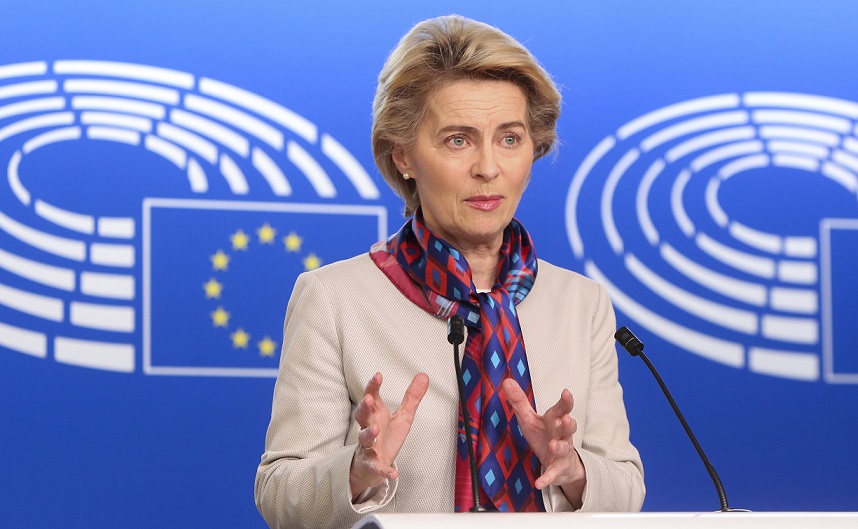Ursula von der Leyen
I am delighted to be here with the College of Commissioners to mark the start of the French Presidency of the Council. France is taking on this prized responsibility in very particular circumstances: the public health situation with regard to COVID-19 is still worrying. However, we are taking strong action on the vaccination front. This has enabled us to vaccinate almost 70% of the entire population and almost 80% of adults in Europe. Not only have we supplied Europeans with 1.2 billion vaccine doses, but in parallel, we have also exported 1.5 billion vaccine doses to over 150 countries. Furthermore, we are massively supporting the economy, in particular with EUR 800 billion under the NextGenerationEU recovery programme.
However, this does not mean other problems are being forgotten. For example, as indeed you mentioned, President, there are considerable tensions at our doorstep, as shown by Russia’s military pressure on Ukraine and its intimidation of Moldova. I am delighted, therefore, that a country with the political weight and experience of France is taking on the Council Presidency at such a delicate time. France’s voice resonates far and wide. And Europe is dear to France.
There are some major files on our agenda. First, of course, on the climate. The Commission has tabled detailed and ambitious proposals for achieving our objective of a 55% reduction in greenhouse gas emissions by 2030. We want to achieve this in a way that is economically efficient and socially fair. I know how important this balance is to you, President, and we fully share this ambition. We are therefore counting on the French Presidency to move these proposals forward.
Secondly, the digital transition. Our common ambition is to make Europe a true digital power in the world, structured according to our rules and values. Last year we put forward ambitious proposals, our digital markets and services legislation, in order to foster innovation, while at the same time making major platforms take on their democratic accountability. I hope and indeed am sure that the French Presidency will move forward on these issues swiftly because, as we know, they are at the heart of European citizens’ concerns.
More generally and as you said, we need to continue to strengthen our economic model, that of an economy which is competitive and social. We are working on a new model for European growth, naturally shaped by the Green Deal, the Digital Agenda and Resilience, in the spirit of NextGenerationEU. This is based on excellence, sustainability and competitive European industry. I am delighted to see our priorities converge in this area too, for example our initiative to develop a competitive hydrogen sector to achieve the objectives of the European Green Deal.
Finally, for this new growth model, I would like to mention the proposal tabled by the Commission three weeks ago on the taxation of multinationals. The European Union is one of the first to implement this historic reform on the minimum tax rate, as agreed by the OECD and the G20. I hope that we will quickly reach an agreement during the French Presidency because this reform is needed to ensure fair global growth.
Another important topic is border management and the strengthening of the Schengen area, our area of free movement. This area is at the heart of the European project, yet it has been weakened by a number of crises. We therefore want to restore, preserve and strengthen the openness of the European Union’s internal borders. To this end, we presented proposals for reforms in this direction in December. And I hope that the French Presidency will be able to give the necessary impetus to make progress on this issue. Of course, this also involves strengthening the management of external borders, combating smuggling networks and working with countries of origin and transit. That is why I also want to see rapid progress on our Pact on Migration and Asylum, which offers precisely such a comprehensive approach.
Secondly, we agree that there is a need for a genuine Defence Union. A Defence Union that prepares us for new threats in the future. For example, the next hybrid attack, no matter where it comes from. So let us agree on our priorities using our Strategic Compass, which is a kind of White Paper on defence. I am delighted that the French Presidency has committed itself to this issue. I have high expectations of the discussion on this subject at the March Summit. I believe it is high time for the Europe of defence to move up a gear.
Finally, I would like to talk about our relations with Africa. Of course, in the context of the COVID-19 pandemic, we need to step up our support for that continent, in terms both of vaccines and of the economic consequences. But beyond this crisis, Africa is obviously a key partner for the future of our continent because it is a geopolitical, economic and demographic space that will be essential in tomorrow’s world. I am therefore looking forward to discussing ways to deepen our partnership at the European Union and Africa Summit in Brussels in February.
This is an outline of an ambitious agenda for the next six months. President, you can count on the Commission’s commitment. And thank you very much for having us here.



